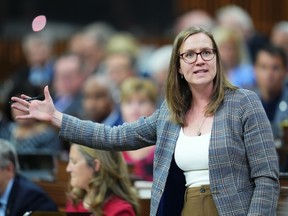Conservative Leader Pierre Poilievre said his party will be voting against the bill

OTTAWA — The government’s proposed two-month GST/HST holiday is expected to be adopted in the House of Commons on Thursday despite opposition from Conservatives and the Bloc Québécois.
The $250 rebates for working Canadians will however still have to wait as the NDP wants to expand them to include retirees and other vulnerable groups who do not have an income.
The GST break will apply to beer, wine, snacks, restaurant meals, but also children’s toys, diapers and clothing, from Dec. 14, 2024, to Feb. 15, 2025. Provinces with the HST like Ontario will also be lifting the provincial portion, offering a bigger tax break.
The Liberals, trailing in the polls for more than a year, are framing this as a way of giving back to Canadians after going through the inflationary pressures due to the pandemic.
“I think Canadians have been going through a lot. This holiday season, the Liberals are waiving the GST on many of the things that they spend money on,” said Ryan Turnbull, parliamentary secretary to the minister of finance, during debate on the bill Wednesday evening.
Conservative Leader Pierre Poilievre said ahead of the vote his party will be voting against the bill.
“This isn’t a tax cut,” he told reporters on Thursday. “This is an inflationary, two-month temporary tax trick that will drive up the cost of living.”
Poilievre accused Prime Minister Justin Trudeau of being “desperate” and clinging onto power with a GST/HST break for a few items that will be taken away “right before raising the carbon tax on heat, housing, groceries and gas” on April 1, 2025.
Poilievre said he would instead push for his plan to scrap the carbon tax and the GST on new homes under $1 million which he claims will be “sparking more production.”
Government House leader Karina Gould called Poilievre’s position “really disappointing.”
“As members of Parliament, we now have an opportunity to come together to provide much needed relief and support to people right across this country,” she said. “The fact that the Conservative leader would rather play politics than support Canadians, I think, is very indicative of who he is and what he really stands for.”
The Bloc Québécois will also be opposing the GST/HST cut because it says the bill is rushed and that some of these measures will be benefit wealthier Canadians.
The Bloc’s finance critic, Gabriel Ste-Marie, said his party agrees with permanently removing the federal tax on items such as diapers and children’s clothing.
“However, we have serious reservations when the government says it is going to eliminate the GST on champagne and fancy restaurants, where only the rich can afford to go.”
The Bloc tabled a motion to properly study the bill in a House of Commons committee and have Finance Minister Chrystia Freeland appear for three hours, but it is unlikely to pass.
New Democrats claimed the Liberals have been copying their homework and presenting a half-baked idea. They are, however, prepared to support it.
“Strangely, the Bloc and the Conservatives are voting against something that will give a break to people who need it,” said NDP Deputy Leader Alexandre Boulerice.
The NDP said it will still be pushing for taking the GST permanently off daily essentials like internet, phone and home heating.
Boulerice said his party’s support for the Liberals’ bill does not mean it supports the government, as it was the case for 18 months under the supply-and-confidence deal.
“We support the measure, not the Liberals,” he said.
The GST/HST break on a slew of goods for two months will cost the government $1.6 billion in lost revenue.
The government estimates a family spending $2,000 on qualifying goods will realize GST savings of $100 over a two-month period. In provinces with a harmonized sales tax like Ontario, that same family would realize HST savings of $260 over that same period.
Ontario and Newfoundland and Labrador have already said they would remove the provincial portion of the HST, but other provinces like New Brunswick are frustrated that the federal Liberals’ new measure will be depriving them of millions in revenue.
The federal government has not yet said if it will compensate those provinces.
It was unclear on Thursday when the Liberals will be tabling legislation to dole out cheques of $250 to 18.7 million Canadians who worked in 2023 and earned $150,000 or less. That measure is expected to happen next spring and will cost taxpayers $4.68 billion.
Some Liberal MPs agreed with the NDP this week that those rebates should also be extended to retirees and other groups who did not work last year.
National Post
[email protected]
Our website is the place for the latest breaking news, exclusive scoops, longreads and provocative commentary. Please bookmark nationalpost.com and sign up for our newsletters here.